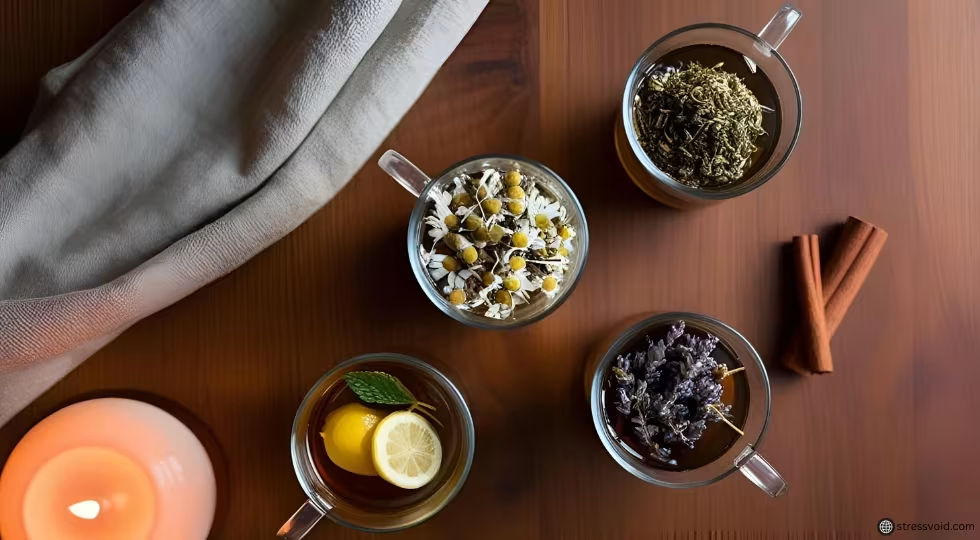Stress is an integral part of this super fast world. Heavy workdays and sleepless nights can stress us out very quickly, and we often feel that there’s no escape from this. But what will be your reaction if i say that the escape from this never ending stress is just a cup of tea, stress relief tea. Stress relief tea is a natural way to calm your mind and body, without the need for expensive treatments or complicated routines. These stress relief teas are generally free of side effects.
Whether you’re looking to calm after a long day, ease anxiety, or simply find a moment of peace, a well chosen herbal tea can provide all the relief you need.
Today, we’ll share easy-to-make stress relief tea recipes using herbs that are known for their calming and restorative properties. Each recipe is provided to help you manage stress and enjoy a sense of tranquility, with ingredients that are very easy to find and simple to brew.
Table of Contents
Why Stress Relief Tea is a Natural Solution
When stress hits, it’s easy to take caffeine, sugar, or even medication pills. But these aren’t solutions these can sometimes make things worse, leading to energy crashes, jitters, or even more anxiety, example- caffeine is very bad bad for our brain. Stress relief tea, on the other hand, provides a gentle and natural alternative to help your body and mind relax without any harsh side effects.
Herbal teas have been used for centuries across different cultures for their healing properties. The beauty of stress relief tea lies in its ability to tap into the natural calming effects of herbs that work synergistically with your body. Many herbs contain compounds that reduce cortisol (the stress hormone), calm the nervous system, and promote a sense of well-being.
For example, chamomile is highly famous for its ability to ease tension and help with sleep, while lavender has a calming effect on the nervous system. Lemon balm has been shown to reduce anxiety and improve mood, while ashwagandha, an adaptogen, helps the body adapt to and manage stress more effectively. Each herb we have mentioned brings its own set of benefits to the table, and when combined in the right blend, they can offer a holistic approach to stress relief.
What makes stress relief tea even more appealing is its simplicity and its cost effectiveness. Unlike complex medications or treatments, these herbal remedies are easy to prepare and can be incorporated into your daily routine. Plus, they provide a moment of calm and mindfulness as you take the time to brew and sip your tea.
Whether you’re new to herbal teas or a long-time fan, stress relief tea offers a natural, accessible way to support your mental and emotional health. It’s a simple solution with a long lasting impact, and with the right recipes, it’s never been easier to start reaping the benefits.
5 Easy Recipes for Stress Relief Tea
Stress relief tea is a simple and soothing way to unwind and reduce stress and these easy recipes are just what you need. Whether you’re experiencing a busy day, struggling to sleep, or feeling anxious, each recipe is made with natural ingredients designed to calm your mind, relax your body, and restore your sense of well-being. Best of all, these recipes are easy to make with ingredients you can find in your local store or pantry, offering you a natural and effective remedy to bring peace.
1. Soothing Chamomile & Lavender Tea
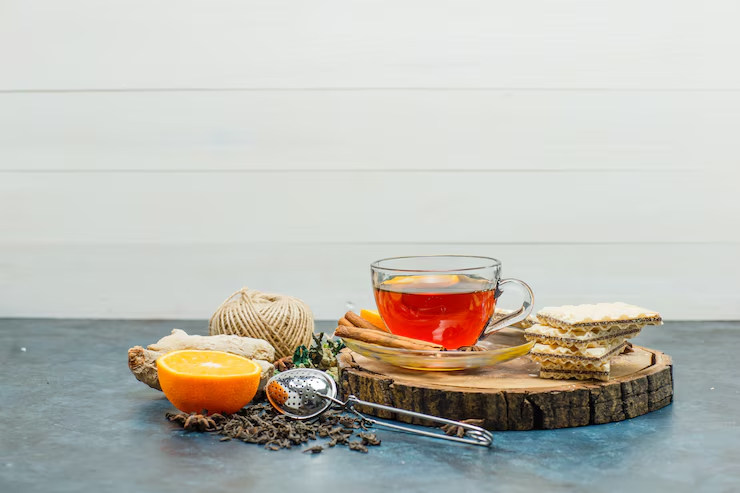
Best for: Relaxing the mind and improving sleep quality
| Ingredients | Instructions |
|---|---|
|
|
Why it works: Chamomile is well-known for its calming and sleep-inducing properties, while lavender offers additional relaxation benefits. Together, they make an ideal tea blend for unwinding after a long day and promoting restful sleep.
2. Lemon Balm & Peppermint Tea
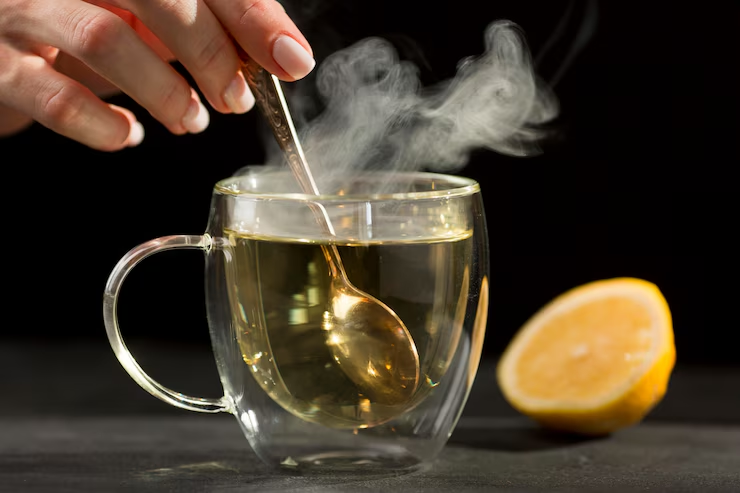
Best for: Reducing stress and promoting calmness
| Ingredients | Instructions |
|---|---|
|
|
Why it works: Lemon balm and peppermint are both known for their calming and soothing effects, making this tea ideal for reducing anxiety and stress. It's a great choice for both day and night use, promoting relaxation without causing drowsiness.
3. Valerian Root & Passionflower Tea
Best for: Deep relaxation and promoting sleep
| Ingredients | Instructions |
|---|---|
|
|
Why it works: Valerian root is renowned for its ability to improve sleep quality and reduce anxiety, while passionflower helps calm the nervous system and promotes relaxation. This tea is an excellent option to enjoy before bed or during stressful moments throughout the day to unwind.
4. Ashwagandha & Ginger Tea
Best for: Reducing stress and promoting relaxation
| Ingredients | Instructions |
|---|---|
|
|
Why it works: Ashwagandha is an adaptogen that helps the body handle stress, while ginger has a warming, soothing effect. This combination makes a perfect tea for relieving tension and promoting relaxation throughout the day.
5. Rooibos & Cinnamon Tea
Best for: Relaxation and boosting metabolism
| Ingredients | Instructions |
|---|---|
|
|
Why it works: Rooibos is naturally caffeine-free, offering a calming effect while cinnamon adds warmth and can help regulate blood sugar levels. This tea is perfect for soothing your mind and body, especially in the evening.
Check Our Other Posts
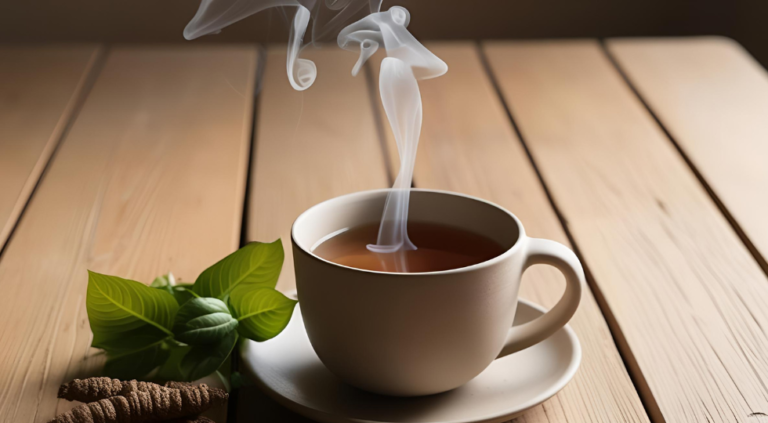
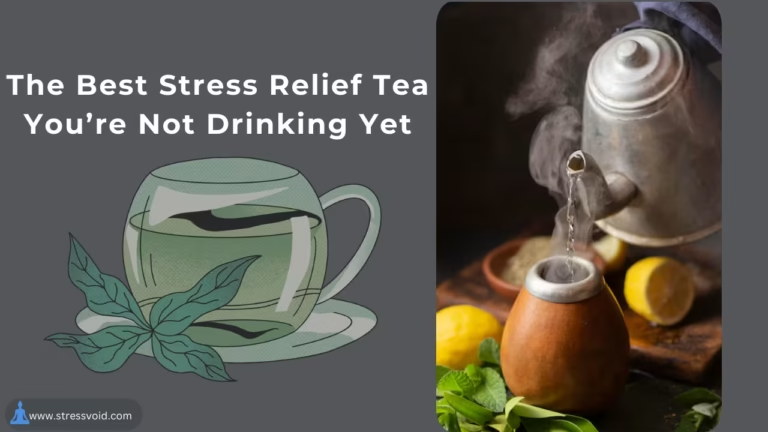
The Best Stress Relief Tea You’re Not Drinking Yet – Holy Basil Benefits
Brewing Tips
To ensure you are extracting the full benefits from your stress relief tea recipes, here are some essential brewing tips. These will help you craft the perfect, soothing cup of tea every time:
1. Use Fresh, High-Quality Herbs
Always opt for fresh, organic, or high-quality dried herbs. Fresh herbs are packed with essential oils and active compounds that are key to unlocking the stress-relieving benefits. Organic herbs ensure you’re not consuming any pesticides or harmful chemicals that could interfere with the tea’s natural healing properties.
2. Pay Attention to Water Temperature
Different herbs require different water temperatures for optimal extraction. For delicate herbs like chamomile or lavender, use water just below boiling (around 180-190°F). For sturdier herbs such as ginger or ashwagandha, boiling water works best. Be mindful of these temperatures to avoid destroying the delicate compounds that make each herb effective.
3. Steep for the Right Amount of Time
Over-steeping your tea can lead to bitterness or overpowering flavors. Follow the recommended steeping times for each type of herb (usually between 5-10 minutes) to achieve the best flavor profile and avoid any unpleasant aftertastes. A shorter steep may not allow full flavor extraction, while too long may make the tea taste overly strong.
4. Strain Properly
After steeping, it’s essential to properly strain out any herbs or leaves. Using a fine mesh strainer or a tea infuser is a great way to remove the herbs without leaving any residue in your tea. This ensures that you enjoy a clear, clean cup of tea without any unwanted bits floating around.
5. Customize to Your Taste
While many of the teas on the list are naturally soothing and flavorful, you can always enhance your tea by adding a sweetener like honey, agave, or stevia. A slice of lemon or a sprig of mint can elevate the flavor and give your tea a refreshing twist.
6. Make It a Ritual
Tea brewing should be a mindful and calming experience. Take the time to brew your tea slowly and enjoy the process. Whether you are preparing your tea in the morning or unwinding before bed, savoring the moment can significantly enhance the calming benefits of your tea.
Final Verdict
We think taking tea for stress relief is a good and effective way, with ingredients like chamomile, lavender, lemon balm, and ashwagandha. These teas have great taste which is very good for medicine type ingredient.

